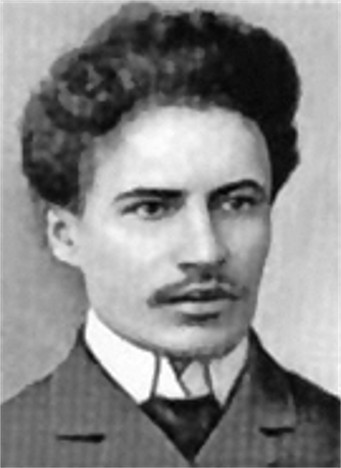The Ukrainian Art Song Project sends you this gift of song…♪
We invite you to listen to a beautiful interpretation of
Not in Silk Swaddling Clothes ~
Не на шовкових пелюшках
Yakiv Stepovy: Composer
Halyna Komarova: Poet
Monica Whicher: Soprano
Albert Krywolt: Piano
Halyna Komarova
Translation: Uliana Pasicznyk and Maxim Tarnawsky
Not in silk swaddling clothes
Nor in a majestic palace,
He was born in a poor home
Amid slavery, darkness, and toil.
His unfortunate mother swaddled
The little one and worried,
And the whole night through
She prayed for her son.
And God heard her prayer
And gave the meek soul strength,
And into the hands of the child He placed
An unusual singing lyre.
The boy grew up, and took his kobza (lyre)
And touched the strings with his fingers
And a strange song poured forth
Swaddled in eternal sadness.
The poem was originally written to commemorate the great Ukrainian poet Taras Shevchenko. Despite his humble birth, he was divinely inspired to become the ‘Kobzar’ (Bard) of Ukraine. The accompaniment imitates the strumming of the ‘bandura’, Ukraine’s national folk instrument. But the last verse, prophesying a better destiny for Ukraine, is omitted.
Галина Комарова
Не на шовкових пелюшках,
Не у величному палаці;
В хатині бідній він родивсь
Серед неволі, тьми і праці.
Нещасна мати сповила
Його малого й зажурилась.
І цілу ніченьку
Вона за сина молилась.
І Бог почув молитву,
І дав душі убогій силу,
І в руки хлопцеві вложив
Співецьку надзвичайну ліру.
І виріс він, і кобзу взяв,
І струн її торкнувсь рукою
І пісня дивна полилась,
Повита вічною журбою.
Поема була написана на честь Тараса Шевченка. Незважаючи на його скромне походження, він був Богом надиханий стати кобзарем України. Супровід нагадує гру на бандурі. Але композитор пропустив останню стрічку, де пророкується краща доля Україні.
Yakiv Stepovyi (1883 - 1921)
From Imperial choirboy to Soviet composer, much of the life story of Yakiv Stepovyi is lost in the historic upheavals that ravaged Ukraine in the 20th century. Even so, Stepovyi’s legacy of art songs, piano pieces, and other vocal works survives almost intact. It reveals a composer who could adapt to changes in politics, culture, and society. His eclectic preludes and other ephemeral piano pieces give way, after WWI, to revolutionary mass songs and arrangements for bandura, a lute-like Ukrainian folk instrument. But there was one constant in Stepovyi’s life: the art song. Each one is an uncompromising declaration of the composer’s artistic ideal. Stepovyi was one of the first modern Ukrainian composers to avoid the direct use of folk material. He sought to transform the traditional language of music into a new modernist idiom and thus create a new national identity.
Yakiv Yakymenko (pseudonym Stepovyi) was born in the city of Kharkiv, in north-eastern Ukraine, then part of the Russian Empire. His father was a poor, retired non-commissioned officer. In 1886, Yakiv’s older brother, composer Fedir Yakymenko (aka Theodore Akimenko), was sent to the Imperial Chapel as a choirboy. Nine years later, Yakiv joined him there in St. Petersburg. Within three years, Yakiv's voice broke and he was forced to leave the choir. Somehow he managed to continue his music studies. A year later, in 1899, he composed the liturgical Cherubic Hymn, opus 1. Then, in 1902, Fedir arranged an interview for his younger brother with Alexander Glazunov and Nikolai Rimsky-Korsakov. Both Russian composers were so impressed with Yakiv’s talent he St. Petersburg Conservatory. The studies lasted for twelve years, until 1914, when Stepovyi finally graduated.
Meanwhile, Stepovyi began to compose art songs and small piano pieces. The first two sets of art songs Barvinky (Periwinkles, 1905–1907), opus 3–4, were published by Idzikowski in Kyiv under his pseudonym. Mykola Lysenko, the father of Ukrainian musical nationalism, reviewed the first nine and found Stepovyi’s music lacking in traditional folk idioms. However, Kyrylo Stetsenko, a fellow composer, praised Stepovyi, especially his song ‘Zymoiu’ (In Winter) on a text by the as-yet unpublished Oleksander Oles. Encouraged, Stepovyi composed the song cycle Nastroї (Moods, 1907–1908), opus 6, based entirely on the poetry of Oles. Then, in 1911, Stepovyi set to music three poems by the fifteenyear- old Maksym Rylsky, the opus 8 song cycle. Both Oles and Rylsky would become giants of 20th-century Ukrainian literature. Nevertheless, Olena Pchilka, editor of Ridnyi (Native Land) and mother of the poet Lesia Ukrainka, refused to publish the Rylsky song cycle in its entirety because it was too modern, too far removed from the folk idiom and, therefore, un-nationalistic. Stepovyi found a more worldly audience in St. Petersburg and Moscow. As early as 1904 he had met a fellow Kharkivite in the northern capital, the renowned opera singer Ivan Alchevsky. They became lifelong friends and supporters of each other’s endeavours. Alchevsky often performed the composer’s songs, and Stepovyi likely wrote some especially for him. It is surmised that it was the Alchevsky family that introduced Stepovyi to the poetry of Oles. After his father’s death in 1911, Stepovyi embarked on a series of journeys in Ukraine and Europe. In the summer of 1912 he visited Alchevsky in Paris, where the opera singer was engaged. Upon his return, he also tried his hand at music criticism, writing a number of articles for the Moscow journal Muzyka.
Stepovyi’s music career was interrupted at the beginning of WWI, when he was conscripted into the army as a secretary on a hospital train. It was only in 1917, when the Russian Revolution broke out, that Stepovyi was able to obtain a discharge. Immediately, he went to Kyiv to start teaching at the newly established Conservatory. There he resumed writing his art songs, which became more and more complex, formalistic.
During the last five years of his life, Stepovyi was caught up in the Ukrainian-Soviet War (1917–1921) and the creation of the new Socialist order. By siding with the Socialists, Stepovyi soon found himself in key bureaucratic positions. He became the music director of the Ukrainian State Theatre of Music and Drama, director of the Folk Conservatory, director of music education in the Ministry of Education, and organizer of the Ukrainian State Symphony Orchestra, the State String Quartet, and the “official” vocal ensemble that toured and performed in factories, refineries, and other industrial complexes. With the demand for proletarian music on the rise, Stepovyi found himself increasingly occupied with writing simple pedagogical pieces for children, working with ensembles of folk instruments, and arranging folk and revolutionary songs for amateur choirs.
Like all revolutions, the new Socialist order also consumed its children. Yakiv Stepovyi died of typhus at the beginning of the first man-made famine in Soviet Ukraine (1921–1923). Within the Soviet paradigm it was impossible to assess Stepovyi’s contribution to the genre of the art song.
own the disk
Listen online
Hello, World!
The Ukrainian Art Song Project has been bringing Ukraine's musical treasures to light since 2004. With your support, we will continue to bring Ukraine's finest composers and their masterpieces to the world stage, where they belong.
Проєкт "Українськa Мистецькa Пісня" поширює найкращі зразки української музики з 2004 року. З Вашою підтримкою ми продовжимо презентувати найкращих українських композиторів та їх шедеври, які належать до світової музичної спадщини.
Your gift can also be made through CanadaHelps as a one-time or monthly donation.








